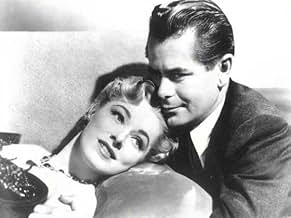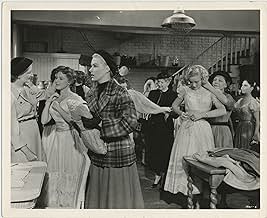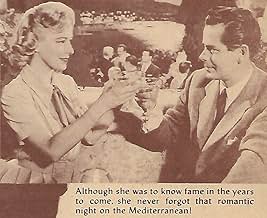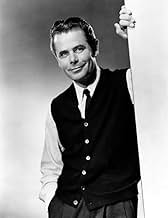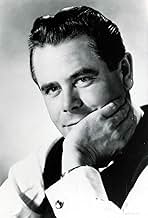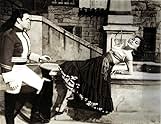NOTE IMDb
6,7/10
1,2 k
MA NOTE
Ajouter une intrigue dans votre langueThis movie chronicles Australian-born opera star Marjorie Lawrence's success, her battle with polio, and her eventual career comeback.This movie chronicles Australian-born opera star Marjorie Lawrence's success, her battle with polio, and her eventual career comeback.This movie chronicles Australian-born opera star Marjorie Lawrence's success, her battle with polio, and her eventual career comeback.
- Récompensé par 1 Oscar
- 1 victoire et 3 nominations au total
Phyllis Altivo
- Louise
- (non crédité)
Benjie Bancroft
- Doctor
- (non crédité)
Francis Barnes
- Singer
- (non crédité)
Louise Bates
- Party Guest
- (non crédité)
Mary Bayless
- Backstage Well-Wisher
- (non crédité)
George Blagoi
- Audience Member
- (non crédité)
Heinz Blankenburg
- Baritone
- (non crédité)
Lulu Mae Bohrman
- Backstage Well-Wisher
- (non crédité)
Histoire
Le saviez-vous
- AnecdotesEleanor Parker can read music, and has perfect pitch as a singer. She decided to study the scores of the opera songs used in this movie on her own. She rented a cabin in Lake Arrowhead, California, and played the records while singing along, until she had the breathing and phrasing memorized. Then when filming the scenes, instead of lip-synching to the tracks recorded by Eileen Farrell for the movie, she sang full voice (but an octave lower). She is proud of the fact that they never had to do a re-take, in order to "match" the tapes. She nailed it on the first take every time.
- GaffesAfter Marjorie sings "Annie Laurie" and she wheels herself into the kitchen and she suggests a concert tour, right as she and Dr. King are embracing .
- Citations
Marjorie Lawrence: [drinking champagne] Tonight I love the whole world and I want them to know it.
Dr. Thomas King: And tomorrow you'll have a monumental hangover.
Marjorie Lawrence: That's the advantage of going out with doctors.
- ConnexionsFeatured in 1955 Motion Picture Theatre Celebration (1955)
- Bandes originalesDon Carlos
(1867) (uncredited)
Music by Giuseppe Verdi
Libretto by François Joseph Méry and Camille du Locle
Aria "O don fatale" Performed by Eleanor Parker (dubbed by Eileen Farrell) with piano accompaniment
Commentaire à la une
Eleanor Parker, a much underrated actress of the 1950s, probably hit the high point of her career when she essayed the role of Marjorie Lawrence in this biographical portrait.
Marjorie Lawrence was an Australian opera star whose career was cruelly interrupted by polio in the 1930s. The film follows Lawrence from her winning a singing contest in her native Winchelsea, Australia through her career with the Metropolitan Opera and her struggle with regaining her health. Lawrence is supported every step of the way by husband Dr. Thomas King,ably played by Glenn Ford. But it's Eleanor Parker's movie all the way.
Funny for a movie about an Australian, Parker doesn't even attempt an Australian accent. This is in the MGM tradition of Clark Gable who did not attempt any British accent in Mutiny on the Bounty. It worked just as well for Parker, though I'd be curious what a native Australian might think. Lawrence was the second female opera star who became a national treasure for Australia, the first being Nellie Melba. Parker shouldered a lot of tradition in this film and did it well.
The voice used by Parker for the operatic sequences is that of Eileen Farrell of the Metropolitan Opera. The sequences are well done, but the real drama in the scenes of Lawrence battling polio.
This film coincidentally enough came out at the same time that Dr. Jonas Salk discovered his vaccine preventive for polio. I still remember as a lad getting those polio shots at my public school. No movie studio could have planned that coincidence, but MGM reaped enormous profit because of it. As for Jonas Salk, no man of medicine has ever been admired in the same way in my lifetime.
Eleanor Parker was nominated for best actress, but lost that year to Anna Magnani in The Rose Tattoo. Look for a young Roger Moore in the role of Parker's brother and business manager.
My favorite scene in the whole film is Parker as Lawrence entertaining the troops overseas in World War II. Especially when she sings Waltzing Matilda to her native Australian diggers. It was like the whole beating heart of the Australian continent coming alive for an instant. Absolutely inspired.
This film gets the highest possible recommendation from me.
Marjorie Lawrence was an Australian opera star whose career was cruelly interrupted by polio in the 1930s. The film follows Lawrence from her winning a singing contest in her native Winchelsea, Australia through her career with the Metropolitan Opera and her struggle with regaining her health. Lawrence is supported every step of the way by husband Dr. Thomas King,ably played by Glenn Ford. But it's Eleanor Parker's movie all the way.
Funny for a movie about an Australian, Parker doesn't even attempt an Australian accent. This is in the MGM tradition of Clark Gable who did not attempt any British accent in Mutiny on the Bounty. It worked just as well for Parker, though I'd be curious what a native Australian might think. Lawrence was the second female opera star who became a national treasure for Australia, the first being Nellie Melba. Parker shouldered a lot of tradition in this film and did it well.
The voice used by Parker for the operatic sequences is that of Eileen Farrell of the Metropolitan Opera. The sequences are well done, but the real drama in the scenes of Lawrence battling polio.
This film coincidentally enough came out at the same time that Dr. Jonas Salk discovered his vaccine preventive for polio. I still remember as a lad getting those polio shots at my public school. No movie studio could have planned that coincidence, but MGM reaped enormous profit because of it. As for Jonas Salk, no man of medicine has ever been admired in the same way in my lifetime.
Eleanor Parker was nominated for best actress, but lost that year to Anna Magnani in The Rose Tattoo. Look for a young Roger Moore in the role of Parker's brother and business manager.
My favorite scene in the whole film is Parker as Lawrence entertaining the troops overseas in World War II. Especially when she sings Waltzing Matilda to her native Australian diggers. It was like the whole beating heart of the Australian continent coming alive for an instant. Absolutely inspired.
This film gets the highest possible recommendation from me.
- bkoganbing
- 4 janv. 2005
- Permalien
Meilleurs choix
Connectez-vous pour évaluer et suivre la liste de favoris afin de recevoir des recommandations personnalisées
- How long is Interrupted Melody?Alimenté par Alexa
Détails
Box-office
- Budget
- 2 367 000 $US (estimé)
- Durée1 heure 46 minutes
- Rapport de forme
- 2.55 : 1
Contribuer à cette page
Suggérer une modification ou ajouter du contenu manquant

Lacune principale
By what name was Mélodie interrompue (1955) officially released in India in English?
Répondre


